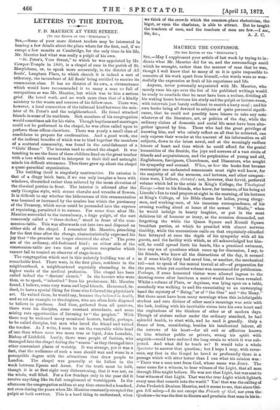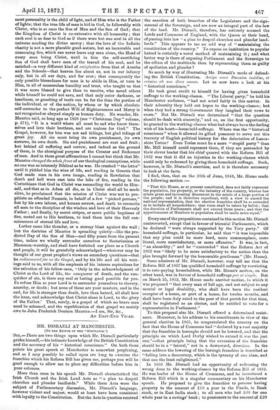MAURICE THE CONFESSOR.
[TO THE EDITOR OF THE " SPEOTATOB.1
SIR, —May I supplement your article of last week by trying to in- dicate what Mr. Maurice did for us, and the surroundings amid
which he wrought, rather than the manner of man that he was, though I well know that to many of us it is quite impossible to conceive of his work apart from himself,—his words were so won- derfully the expression or fruit of his experience and life.
Anyone, never personally acquainted with Mr. Maurice, who merely runs his eye over the list of his published writings would.
be ready to conclude that he must have been a recluse, dividing all his waking hours between his study and the pulpit or lecture-room, with intervals just barely sufficient to snatch a hasty meal ; and his own books being all devoted to subjects of quite perennial signifi- cance, that he could not possibly have leisure to take any note whatever of the literature, art, or politics of the day, while the ordinary claims of domestic and social life must have been alto- gether ignored by him. Those who had the great privilege of knowing him, and who calmly reflect on all that he achieved, can only express their wonder at the amount of his information on all subjects, down to the latest novel, and at the seemingly endless leisure of heart and time which he could afford for the genial humanities of the fireside, the joys and sorrows of a vast circle of friends and acquaintances, and the perplexities of young and old, Englishmen, foreigners, Churchmen, and Dissenters, who sought
his sympathy and counsel. When, or how the books first became manuscript one undaunted amanuensis must right well know, for
the majority of all the sermons, and lectures, and other composi-
tions were, I believe, dictated; not, however, that fervid, perfervid volume which led to the crisis in King's College, the Theological Essays :—but to his friends, who knew, for instance, of his being at Lincoln's Inn to read prayers at eight in the morning, of his lectures at King's College, of his Bible classes for ladies, young clergy- men, and working-men, of his immense correspondence, of his evening reading aloud at home of the newest "Muffle," when.
he would indulge in hearty laughter, or put in the most delicious bit of humour or irony, as the occasion demanded, not forgetting the while the Queen Square and Russell Square breakfast parties, at which he presided with almost nervous timidity, while the unconscious smile on that exquisitely-chiselled face betrayed at once the depth of his sympathy with all his guests, and the facility with which, as all acknowledged but him-- self, he could spread forth his hands, like a practised swimmer, into any sea of questions which came up for discussion, I say, to his friends, who knew all the distractions of the day, it seemed as if some kindly fairy bad saved him, or another, the mechanical.
toil—not to speak of the mental travail at all—of preparation for the press, when yet another volume was announced for publication.
Perhaps, if some honoured visitor were allowed ingress to the drawing-room after luncheon a secret would have been revealed. Whilst a volume of Plato, or Aquinas, was lying open on a table, somebody was walking to and fro enunciating to an unwearying hand the mystery of " Being," or of "the One" and "the Many." But there must have been many mornings when this indefatigable
student and rare diviner of other men's meanings was astir with the lark, looking with his inevitable vision into his own heart and• the cogitations of the thinkers of other or of modern days.
Though of stature rather under the ordinary standard, he had splendid health, to start with, and he used it grandly. Only a frame of iron, considering, besides his intellectual labour, all the sorrows of his heart—for all evil or affliction known. to him whether public or private, wrung his spirit with anguish—could have endured the long strain to which it was sub-
jected. And what did he teach us? It would take a whole Spectator to answer that question ; but I hope I may, with rever-
ence, say that in the Gospel he loved so profoundly there is a
passage which will utter better than I can what his mission was : "There was a man sent from God, whose name was Joux. The-
same came for a witness, to bear witness of the Light, that all men through Him might believe. He was not that Light, but was sent to- bear witness of that Light. That was the true Light which lightetly
every man that cometh into the world." Yes! that was the calling of John Frederick Denison Maurice, and it seems to me, that since Ori- gen fell asleep—I do not except the Friends of God, nor even the Quakers—he was the first to discern and proclaim that man in his in- most personality is the child of light, and of Him who is the Father of lights; that the true life of man is hid in God, in fellowship with Christ, who is at once the Son of Man and the Son of God ; that the Kingdom of Christ is co-extensive with all humanity ; that each soul is as dear to God as if there were but one soul in all the universe needing the divine mercy ; that the love of the Infinite charity is not a mere placable good-nature, but an inexorable and consuming fire, which can never leave any man alone, the Head of every man being Christ, until in him the self-sacrificing Son of God shall have seen of the travail of his soul, and be satisfied—a very different kind of satisfaction from that of Anselm and the Schools—that heaven lies about us, not in our infancy only, but in all our days, and for ever ; that consequently the -only possible blessedness for man is to abide in Him, or turn to Him, in all of measureless humility and trust, who taught us that it was more blessed to give than to receive, who saved others while himself he could not save, and that only outer darkness, or loneliness, or gnashing of teeth can be for the time the portion of the individual, or of the nation, by whom or by which absolute iself-surrender to the perfect Will of Righteousness and Mercy is not recognised or obeyed simply as human duty. No wonder, Mr. Maurice said, so long ago as 1838 (see "Christmas Day" volume, p. 374), "It is a world where all must be sad who know them- selves and love their brethren, and are zealous for God." The Gospel, however, for him was not sad tidings, but glad tidings of great joy. All sin must bring its own punishment, its own eorrows, its own death. Sin and punishment are root and fruit; but behind all suffering and sorrow, and indeed as the ground of these, is the aboriginal purpose of the Creator and Redeemer of men. And in these great affirmations I cannot but think that Mr. Maurice changed the whole front of our theological conceptions, while -no one was so intensely Biblical as he was. He crushed "the letter" until it yielded him the wine of life, aad reading in Genesis that -God made man in his own image, reading in Revelation that death and hell were cast into the lake of fire, reading in the -Corinthians that God in Christ was reconciling the world to Him- self, and that as in Adam all die, so in Christ shall all be made alive, he proclaimed that the mission of Christ was not to pro- ,pitiate an offended Nemesis, in behalf of a few "picked persons," but by his own labour, and human sorrow, and death to reconcile all men to the discipline of the wisdom and love of their Heavenly Father; and finally, by secret stripes, or more public baptisms of dre, meted out to His brethren, to lead them into the full con- -sciousness of eternal life and love.
Luther came like thunder, or a stormy blast against the wall ; but the doctrine of Maurice is spreading quietly—like the pre- -dieted Day of the Son of Man—and fifty years from the present time, unless we wholly surrender ourselves to Sectarianism or Mammon-worship, and shall have forfeited our place as a Church and people, it will be gratefully acknowledged—whatever may be thought of our great prophet's views on secondary questions—that he rediscovered for us the Gospel, and by his life and all his writ- ings said to us, with all the emphasis of his intense aspirations for the salvation of his fellow-men, 'Only in the acknowledgment of Christ as the Lord of life, the conqueror of death, and the van- -qaisher of sin, is there any real or lasting good possible for you. To refuse Him as your Lord is to surrender yourselves to slavery, anarchy, or death ; but none of these are your masters, and in the -end, for life is stronger than death, love than hatred, all shall bow the knee, and acknowledge that Christ alone is Lord, to the glory of the Father.' That, surely, is a gospel of which no brave man need be ashamed, and the republication of that gospel we mainly owe to John Frederick Denison Maurice.—I am, Sir, &c.,
AN EAST-END VICAR.



































 Previous page
Previous page